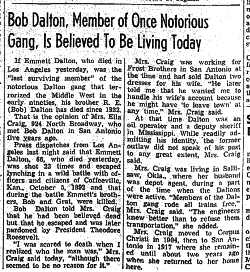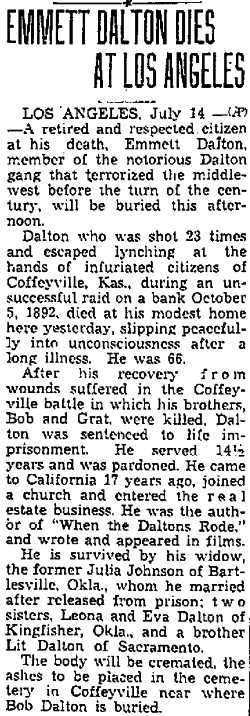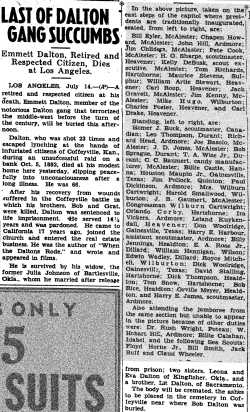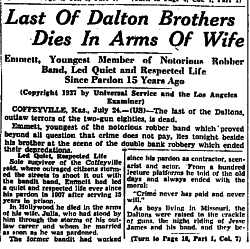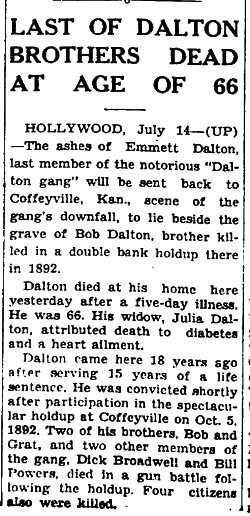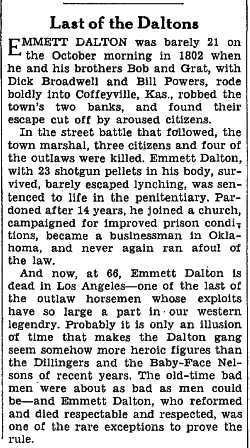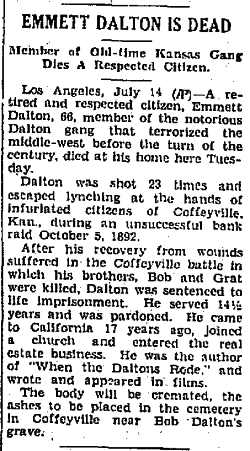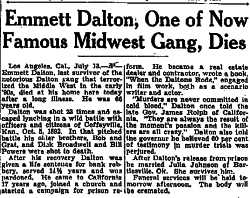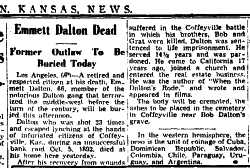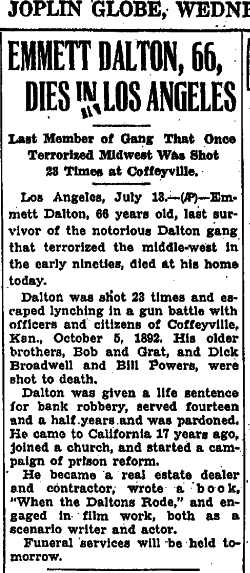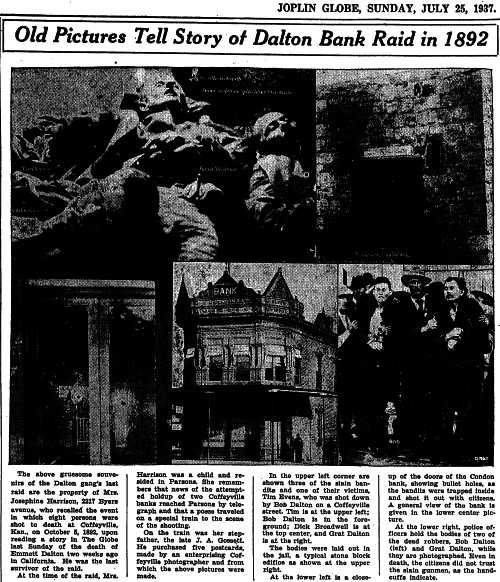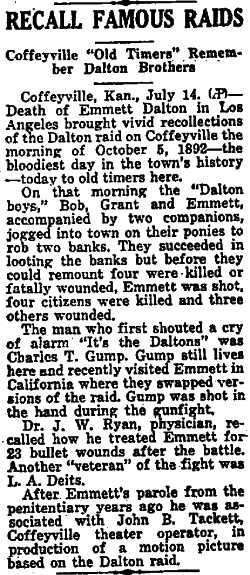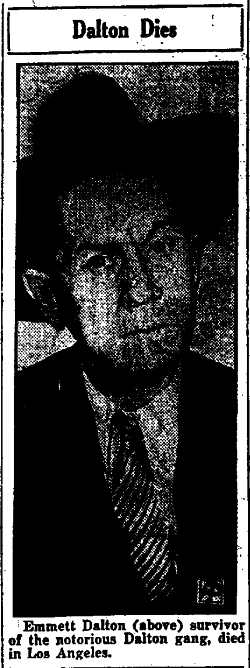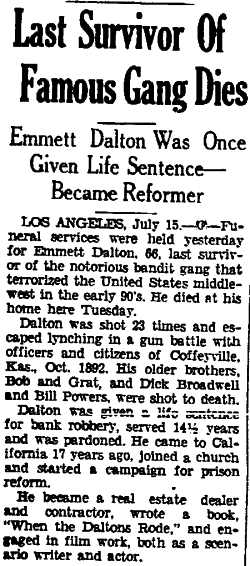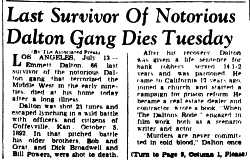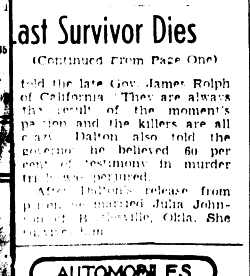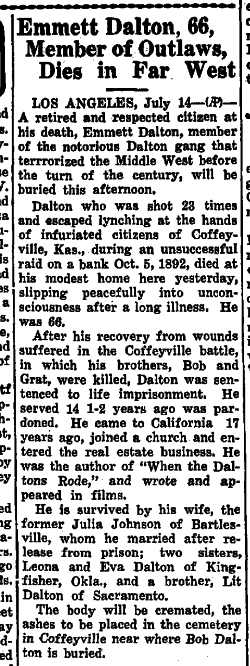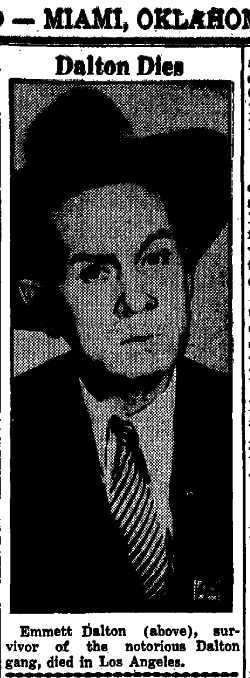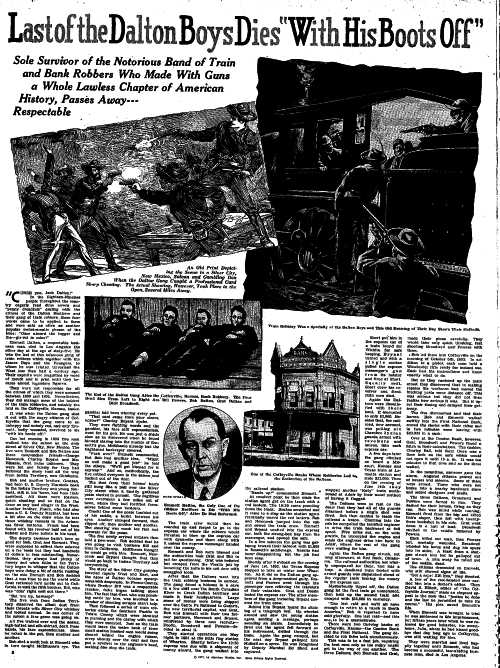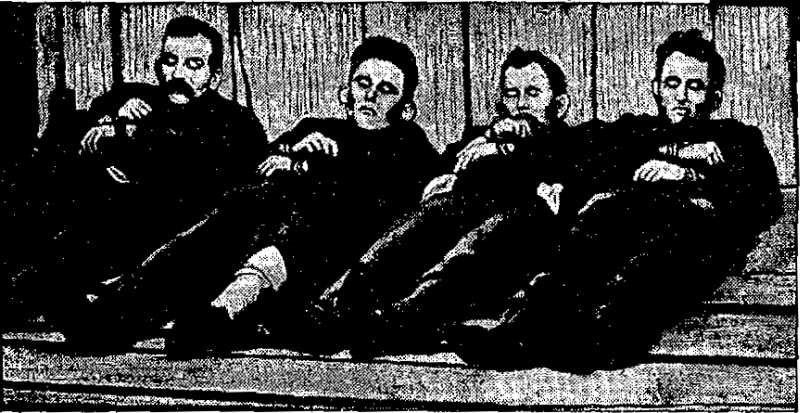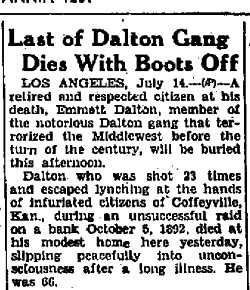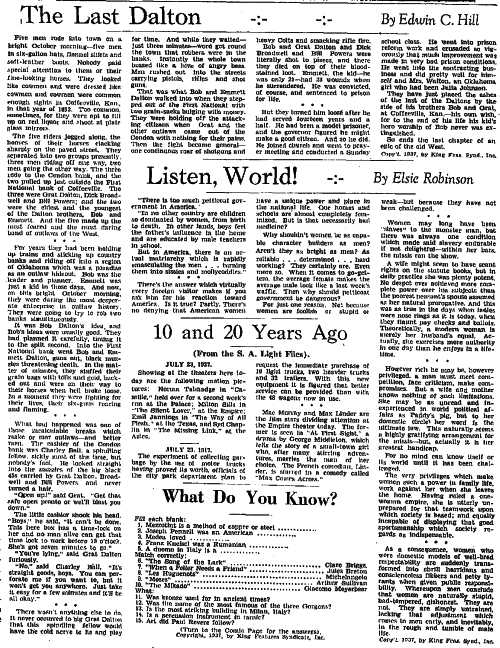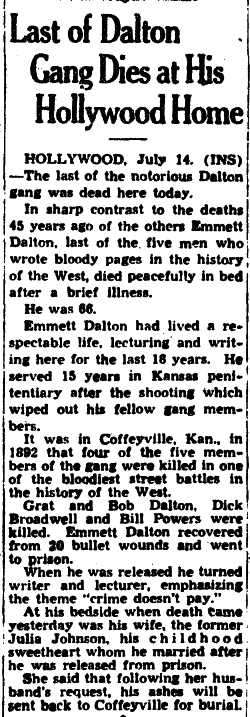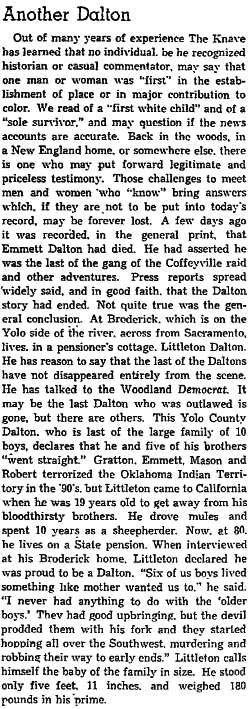Miscellaneous Newspaper Clippings
For the Dalton Brothers.
No mention of anyone named Bea or Elizabeth or Phillips!
Emmett Dalton Gets Parole
Coffeyville Journal, July 5, 1907
DALTON GETS PAROLE
ALLOWED TO GO TO KANSAS CITY TO GET HIS ARM TREATED.
FOUR MONTHS OUT OF PRISON
Believed Here That It Is the Beginning of the End of His Prison Sentence. — Action Wednesday.
The action of the board of parole of the Kansas State penitentiary in recommending for Emmett Dalton a provisional parole which will be granted by Gov. Hoch, is taken here as being the first step toward Dalton's final parole. Dalton is suffering from a wounded arm and must have hospital treatment. After his arm is cured, it is believed that Gov. Hoch will continue his parole.
Leavenworth, Kan., July 5–Emmett Dalton, the famous "death" prisoner, appeared before the Kansas penitentiary parole board Wednesday afternoon and requested that he be granted an opportunity to go to a hospital in Kansas City to have his right arm operated on to save it from amputation. He is in danger of losing his arm from a gun shot wound received in the Coffeyville raid nearly fifteen years ago, when two of his brothers were killed and the Dalton gang broken up. The wound did not receive proper attention after his capture.
Dalton's wound has been under treatment at the penitentiary hospital three months and suffered so much from it that he had to remain in the hospital seven weeks. Dr. Kanaval, the prison physician, called the attention of the members of the prison board to Dalton's condition and asked that some arrangement be made to have him operated on.
Dalton Promised to Return
When Dalton appeared before the board he said: "I'll promise to break no parole and to come back and make any report deisred if you give me a chance to save my arm."
Captain Seaton mentioned that the board had no funds from which money could be secured to pay for a special operation or expenses at a hospital, but Dalton said that his mother would try to raise it and if she failed his arm would go.
The board has no power to grant a parole to a prisoner under sentence of death or second degree murder. After consultation it was decided and a resolution adopted, the warden and three directors, who make up the parole board, all favoring it, to recommend to Gov. Hoch that he grant Dalton a provisional parole for four months. The recommendation for provisional parole will be forwarded to Gov. Hoch at once. The governor is expected to act upon it favoravly(sic) at once, and Dalton will then be released, probably in charge of hs mother, for the time he is at liberty.
Confidence in Dalton.
The warden and prison officials have full confidence that Dalton will live up to the provisions of a parole. Dalton was made a "trusty" in February and except for the time he has been confined to the hospital, has gone about Lansing, to the railroad depot and everywhere.
Dalton was brought to the penitentiary March 8, 1893, under sentence to be hanged. He has served more than fourteen years. He was head cutter in the prison tailor shop many years.
Story of the Dalton Raid.
Emmett Dalton is the sole survivor of the notorious Dalton gang. In 1892 three Dalton brothers and two other bandits, the gang led by Robert Dalton, appeared in Coffeyville on the border of Indian territory, for the purpose of robbing the two banks of the place. They timed their arrival for 9 o'clock when banks usually open for the day's business. Robert and Emmett went to one bank and the remaining three bandits to the other. Robert and Emmett obtained $22,000 with which they fled. They might have escaped, but they waited for the other three, and while they wre waiting Robert was shot dead by pursuing citizens and Emmett was so badly wounded that he was easily captured.
When the three bandits who were set to rob the other bank reached the counter their mission was suspected and the cashier, to gain time, told them that the time lock had not gone off yet. While they waited the citizens were aroused and a fight resulted. In the engagement four of the robbers and four citizens were killed, and Emmett Dalton was wounded. When he finally recovered he pleaded guilty before Judge J.D. McCue, who sentenced him to be hanged, which, under the statute of Kansas, amounts to life imprisonment.
The Daltons were Kentuckiaans (sic). they were cousins by marriage of the notorious Youngers, and in them the lust of slaughter was inborn. In 1889 the Dalton family, father and mother and thirteen children, among them Bob, Emmet and Grattan, went to Kansas. they settled on a farm in Montgomery county, where they remained until the opening of Indian territory. Then the life of adventure that proved their undoing began. First, United States deputy marshals, then train robbers, whiskey peddlers, and bandits in the mountain passes of California; then bank robbers.
Emmett Dalton was 20 years old when he was captured. His mother never ceased to work for his relaese. In 1901 a strong effort was made for a pardon for him, but Governor Stanley refused to grant it.
Source: Coffeyville Journal, July 5, 1907
Bob Dalton Hoax
Corpus Christi Times July 14, 1937
Bob Dalton, Member of Once Notorious Gang, Is Believed To Be Living Today
If Emmett Dalton, who died in Los Angeles yesterday, was the "last surviving member" of the notorious Dalton gang that terrorized the Middle West in the early nineties, his brother R.E. (Bob) Dalton has died since 1932.That is the opinion of Mrs. Ella Craig, 924 North Broadway, who met Bob Dalton in San Antonio five years ago.
Press dispatches from Los Angeles last night said that Emmett Dalton, 66, who died yesterday, was shot 23 times and escaped a lynching in a wild battle with officers and citizens of Coffeeville, Kan., October 5, 1892 and that during the battle Emmett's brothers, Bob and Grat, were killed.
Bob Dalton told Mrs. Craig that he had been believed dead but that he escaped and was later pardoned by President Theodore Roosevelt.
"I was scared to death when I realized who the man was," Mrs. Craig said today, "although there seemed to be no reason for it."
Mrs. Craig was working for Frost Brothers in San Antonio at the time and had sold Dalton two dresses for his wife. "He later told me that he wanted me to handle his wife's account because he might have 'to leave town' at any time," Mrs. Craig said.
At that time Dalton was an oil operator and a deputy sheriff in Mississippi. While readily admitting his identity, the former outlaw did not speak of his past to any extent, Mrs. Craig said.
Mrs. Craig was living in Sallisaw, Okla., where her husband was a depot agent, during a part of the time when the Daltons were active. "Members of the Dalton gang rode all trains free," Mrs. Craig said. "The engineers knew better than to refuse them transportation," she added.
Mrs. Craig moved to Corpus Christi in 1904, then to San Antonio in 1917 where she remained until about two years ago when she returned to her home here.
Source: Corpus Christi Times July 14, 1937
Emmett Dalton
unknown paper, July 14, 1937
EMMETT DALTON REMAINS TO COFFEYVILLE
Will Be Buried Beside His Brother Bob; Widow a Bartlesville Woman
(By the Associated Press)LOS ANGELES, July 14.–A retired and respected citizen at his death, Emmett Dalton, member of the notorious Dalton gang that terrorized the middle-west before the turn of the century, will be buried this afternoon.
Dalton who was shot 23 times and escaped lynching at the hands of infuriated citizens of Coffeyville, Kas., during an unsuccessful raid on a bank October 5, 1892, died at his modest home here yesterday, slipping peacefully into unconsciousness after a long illness. He was 66.
After his recovery from wounds, suffered in the Coffeyville battle in which his brothers, Bob and Grat, were killed, Dalton was sentenced to life imprisonment. He served 14½ years and was pardoned. He came to California 17 years ago, joined a church and entered the real estate business. He was the author of "When the Daltons Rode," and wrote and appeared in films.
He is survived by his widow, the former Julia Johnson of Bartlesville, Okla., whom he married after released from prison; two sisters, Leona and Eva Dalton of Kingfisher, Okla., and a brother Lit Dalton of Sacramento.
The body will be cremated, the ashes to be placed in the cemetery in Coffeyville near where Bob Dalton is buried.
Source: Unknown paper July 14, 1937
Ada Evening News, July 14, 1937
EMMETT DALTON DIES AT LOS ANGELES
LOS ANGELES, July 14 –(AP)–A retired and respected citizen at his death, Emmett Dalton, member of the notorious Dalton gang that terrorized the middle-west before the turn of the century, will be buried this afternoon.Dalton who was shot 23 times and escaped lynching at the hands of infuriated citizens of Coffeyville, Kas., during an unsuccessful raid on a bank October 5, 1892, died at his modest home here yesterday, slipping peacefully into unconsciousness after a long illness. He was 66.
After his recovery from wounds, suffered in the Coffeyville battle in which his brothers, Bob and Grat, were killed, Dalton was sentenced to life imprisonment. He served 14½ years and was pardoned. He came to California 17 years ago, joined a church and entered the real estate business. He was the author of "When the Daltons Rode," and wrote and appeared in films.
He is survived by his widow, the former Julia Johnson of Bartlesville, Okla., whom he married after released from prison; two sisters, Leona and Eva Dalton of Kingfisher, Okla., and a brother Lit Dalton of Sacramento.
The body will be cremated, the ashes to be placed in the cemetery in Coffeyville near where Bob Dalton is buried.
Source: Ada Evening News, July 14, 1937
Ardmore Daily Ardmoreite July 14, 1937
LAST OF DALTON GANG SUCCUMBS
Emmett Dalton, Retired and Respected Citizen, Dies at Los Angeles.LOS ANGELES, July 14.–(AP)–A retired and respected at his death, Emmett Dalton, member of the notorious Dalton gang that terrorized the middle-west before the turn of the century, will be buried this afternoon.
Dalton, who was shot 23 times and escaped lynching at the hands of infuriated citizens of Coffeyville, Kan., during and unsuccessful raid on a bank Oct. 5, 1892, died at his modest home here yesterday, slipping peacefully into unconsciousness after a long illness. He was 66.
After his recovery from wounds suffered in the Coffeyville battle in which his brothers, Bob and Grat, were killed, Dalton was sentenced to life imprisonment. He served 14½ years and was pardoned. He came to California 17 years ago, joined the church and entered the real estate business. He was the author of "When the Daltons Rode," and wrote and appeared in films.
He is survived by his widow, the former Julia Johnson of Bartlesille, Okla., whom he married after release from prison; two sisters, Leona and Eva Dalton of Kingfisher, Okla., and a brother, Lit Dalton, of Sacramento.
The body will be cremated, the ashes to be placed in the cemetery in Coffeyville near where Bob Dalton is buried.
Source: Ardmore Daily Ardmoreite July 14, 1937
Charleston Gazette July 25, 1937, p. 1
Last of Dalton Brothers Dies in Arms Of Wife
Emmett, Youngest Member of Notorious Robber Band, Led Quiet and Respected LifeSince Pardon 15 years Ago
(Copyright 1937 by Universal Service and the Los Angeles Examiner)
COFFEYVILLE, Kas., July 24.–(US)–The last of the Daltons, outlaw terrors of the two-gun eighties, is dead.
Emmett youngest of the notorious robber band which proved beyond all question that crime does not pay, lies tonight beside his brother at the scene of the double bank robbery which ended their depredations.
Led Quiet, Respected Life
Sole Survivor of the Coffeyville raid, where outraged citizens stormed the streets to shoot it out with the bandit band, Emmett had led a quiet and respected life ever since his pardon in 1907 after serving 15 years in prison.In Hollywood he died in the arms of his wife, Julia, who had stood by him through the storms of his outlaw career and whom he married as soon as he was pardoned.
The former bandit had worked since his pardon as contractor, scenarist and actor. From a hundred lecture platforms he told of the old days and always ended with the moral:
"Crime never has paid and never will."
As boys living in Missouri, the Daltons were raised to the crackle of guns, the night riding of Jesse James and his band, and they be-
(Turn to Page 16, Part 1, Col. 7)
Source: Charleston Gazette July 25, 1937, p. 1
Charleston Gazette July 25, 1937, p. 16
Last of Dalton Brothers Dies in Wife's Arms
(Continued from Page 1)came entwined in the tempestuous course of events.
Grat even in his younger days was easily stirred to wrath and he took-wild joy in fighting. Bob, who became the band's leader, developed into a cool and calculating gunman. He always held his fire until he was sure one bullet would do the job at hand.
Quit Over Unpaid Wages
The two brothers grew up with respect for the law and all entered government service as U.S. marshals, guards and possemen. Until Bob broke with the service over unpaid wages, the trio patrolled the Indian territory. When Bob quit, Emmett and Grat joined him, vowing they would never draw a gun for the law again.Without jobs, they became restless and uneasy, and with other members of the gang they drifted into a New Mexico mining camp. There the charter members of the Dalton gang, Emmett, Bob, George Newcomb, Charley Bryant and William McElhanie, played the faro game.
They were trimmed by a crooked gambler and, finding out they had been played for suckers, the band sauntered to the bar. In unison their guns leaped out and they covered the dealer, proprietor and patrons. Then, with calm assurance, they cleaned the gambler of his spoils, and the Daltons had begun their career of outlawry.
It was a career that led to forays against express trains and banks throughout Texas, Kansas and the Indian territory.
A series of successful forays followed, but the final reckoning was near and it came in Coffeyville Oct. 5, 1892.
The Daltons, Bill Powers and Dick Broadwell rode into town and dismounted in an alley near the First National and Condon banks which were located opposite each other. The band split into two parties and started for the banks.
Bob and Emmett entered the First National and Grat with his companions stepped into the Condon bank. Grat flashed his gun and demanded the cashier open the safe.
Gives Alarm
Outside, Charley Gump, a drayman ran down the street shouting "The Daltons."Citizens grabbing rifles and pistols quit their work and swarmed into the street.
Bob and Emmett had emptied the vault at the First National when the citizens' bullets shattered the windows. As the fire increased, the bandits started shooting their way out. A bullet took Bob. An instant later Grat was shot through the chest. Emmett was near his horse and ready for the getaway when he saw Bob Fall(sic). Than a Winchester slub(sic) shattered his arm, but he climbed into the saddle and rode to the dying Bob. There, as he leaned over his brother, he was brought down by a charge of buckshot.
The battle was over. Two of the Daltons were dead. Emmett was badly wounded and four citizens had been killed.
Source: Charleston Gazette July 25, 1937, p. 16
Circleville Herald July 14, 1937
LAST OF DALTON BROTHERS DEAD AT AGE OF 66
HOLLYWOOD, July 14–(UP)–The ashes of Emmett Dalton, last member of the notorious "Dalton gang" will be sent back to Coffeyville, Kan., scene of the gang's downfall, to lie beside the grave of Bob Dalton, brother killed in a double bank holdup there in 1892.Dalton died at his home here yesterday after a five-day illness. He was 66. His widow, Julia Dalton, attributed death to diabetes and a heart ailment.
Dalton came here 18 years ago after serving 15 years of a life sentence. He was convicted shortly after participation in the spectacular holdup at Coffeyville on Oct. 5, 1892. Two of his brothers, Bob and Grat, and two other members of the gang, Dick Broadwell and Bill Powers, died in a gun battle following the holdup. Four citizens also were killed.
Source: Circleville Herald July 14, 1937
El Paso Herald Post July 15, 1937
Last of the Daltons
EMMETT DALTON was barely 21 on the October morning in 1802((sic - 1892) when he and his brothers Bob and Grat, with Dick Broadwell and Bill Powers, rode boldly into Coffeyville, Kas., robbed the town's two banks, and found their escape cut off by aroused citizens.In the street battle that followed, the town marshal, three citizens and four of the outlaws were killed. Emmett Dalton, with 23 shotgun pellets in his body, survived, barely escaping lynching, was sentenced to life in the penitentiary. Pardoned after 14 years, he joined a church, campaigned for improved prison conditions, became a businessman in Oklahoma, and never again ran afoul of the law.
And now, at 66, Emmett Dalton is dead in Los Angeles–one of the last of the outlaw horsemen whose exploits have so large a part in our western legendry. Probably it is only an illusion of time that makes the Dalton gang seem somehow more heroic figures than the Dillingers and Baby-Face Nelsons of recent years. the old-time bad men were about as bad as men could be–and Emmett Dalton, who reformed and died respectable and respected, was one of the rare exceptions to prove the rule.
Source: El Paso Herald Post July 15, 1937
Emporia Gazette July 14, 1937
EMMETT DALTON IS DEAD
Member of Old-time Kansas Gang Dies a Respected Citizen.Los Angeles, July 14 (AP)–A retired and respected citizen, Emmett Dalton, 66, member of the notorious Dalton gang that terrorized the middle-west before the turn of the century, died at his home here Tuesday.
Dalton was shot 23 times and escaped lynching at the hands of infuriated citizens of Coffeyville, Kan., during an unsuccessful bank raid October 5, 1892.
After his recovery from wounds suffered in the Coffeyville battle in which his brothers, Bob and Grat were killed, Dalton was sentenced to life imprisonment. He served 14½ years and was pardoned. He came to California 17 years ago, joined a church and entered the real estate business. He was the author of "When the Daltons Rode," and wrote and appeared in films.
The body will be cremated, the ashes to be placed in the cemetery in Coffeyville near Bob Dalton's grave.
Source: Emporia Gazette July 14, 1937
Galveston Daily News July 14, 1937
Emmett Dalton, One of Now Famous Midwest Gang, Dies
Los Angeles, Cal., July 13.–AP–Emmett Dalton, last survivor of the notorious Dalton gang that terrorized the Middle West in the early '90s, died at his home here today after a long illness. He was 66 years old.Dalton was shot 23 times and escaped lynching in a wild battle with officers and citizens of Coffeyville, Kan., Oct. 5, 1892. In that pitched battle his older brothers, Bob and Grat, and Dick Broadwell and Bill Powers were shot to death.
After his recovery Dalton was given a life sentence for bank robbery, served 14½ years and was pardoned. He came to California 17 years ago, joined a church and started a campaign for prison reform. He became a real estate dealer and contractor, wrote a book, "When the Daltons Rode," engaged in film work, both as a scenario writer and actor.
"Murders are never committed in cold blood," Dalton once told the late Gov. James Rolph of California, "They are always the result of the moment's passion and the killers are all crazy." Dalton also told the governor he believed 60 per cent of testimony in murder trials was perjured.
After Dalton's release from prison he married Julia Johnson of Bartlesville, Ok. She survives him.
Funeral services will be held tomorrow after noon. The body will be cremated.
Source: Galveston Daily News July 14, 1937
Hammond Times July 15, 1937
LAST OF DALTON GANG DEAD
HOLLYWOOD, July 15.–(INS)–The last of the notorious Dalton gang was dead here today.Emmett Dalton, last of the five men who wrote bloody pages in the history of the west, died peacefully in bed after a brief illness.
He was 66.
Emmett Dalton had lived a respectable life, lecturing and writing here for the last 18 years. He served 15 years in Kansas penitentiary after shooting which wiped out his fellow gang membres(sic), 45 years ago.
It was in Coffeyville, Kan., in 1892 that four of the five members of the gang were killed in one of the bloodiest street battles in the history of the west.
Grat and Bob Dalton, Dick Broadwell and Bill Powers were killed. Emmett Dalton recovered from 20 bullet wounds and went to prison.
When he was released he turned writer and lecturer, emphasizing the theme "Crime Doesn't Pay."
At his bedside when death came yesterday was his wife, the former Julia Johnson, his childhood sweetheart whom he married after he was released from prison.
She said that following her husband's request, his ashes will be sent back to Coffeyville for burial.
Source: Hammond Times July 15, 1937
Hutchinson News July 14, 1937
Emmett Dalton Dead
Former Outlaw to Be Buried TodayLos Angeles, (AP)–A retired and respected citizen at his death, Emmett Dalton, 66, member of the notorious Dalton gang that terrorized the middle-west before the turn of the century, will be buried this afternoon.
Dalton who was shot 23 times and escaped lynching at the hands of infuriated citizens of Coffeyville, Kas., during an unsuccessful bank raid Oct. 5, 1892, died at his home here yesterday.
After his recovery from wounds suffered in the Coffeyville battle in which his brothers, Bob and Brat were killed, Dalton was sentenced to Life imprisonment. He served 14½ years and was pardoned. He came to California 17 years ago, joined a church and entered the real estate business. He was the author of "When the Dalton's Rode," and wrote and appeared in films.
The body will be cremated, the ashes to be placed in the cemetery in Coffeyville near Bob Dalton's grave.
Source: Hutchinson News July 14, 1937
Joplin Globe July 14, 1937
EMMETT DALTON, 66, DIES IN LOS ANGELES
Last Member of Gang That Once Terrorized Midwest Was Shot 23 Times at Coffeyville.Los Angeles, July 13.–(AP)–Emmett Dalton, 66 years old, last survivor of the notorious Dalton gang that terrorized the middle-west in the early nineties, died at his home today.
Dalton was shot 23 times and escaped lynching in a gun battle with officers and citizens of Coffeyville, Kan., October 5, 1892. His older brothers, Bob and Grat, and Dick Broadwell and Bill Powers, were shot to death.
Dalton was given a life sentence for band robbery, served fourteen and a half years and was pardoned. He came to California 17 years ago, joined a church, and started a campaign of prison reform.
He became a real estate dealer and contractor, wrote a book "when the Daltons Rode," and engaged in film work, both as a scenario writer and actor.
Funeral services will be held tomorrow.
Source: Joplin Globe July 14, 1937
Joplin Globe July 18, 1937
8 KILLED IN DALTON GANG'S LAST RAID
Old-Timer at Coffeyville Recalls Details of Battle That Followed Holdup of Two Banks.Coffeyville, Kan., July 17.–(AP)–Time was when every lip could tremble with the bloody tale of the Dalton raid on Coffeyville.
Now time, which only this week, quietly marked off the last survivor of that notorious outlaw band, Emmett Dalton, has blurred the memories so that one must search long to find the few who knew the details.
Eight men were killed and several wounded October 5, 1892, when the Daltons rode into town, robbed both banks, and were trapped by citizens in "Death Alley." Young Emmett was the only bandit who came of of the gunfight alive–and he was filled withm(sic) buckshot.
Among the few old-timers who recall the raid is Charles T. Gump, 77. Gump dashed out a hardware store with a shotgun and yelled:
"It's the Daltons!"
Warning Brought Hail of Bullets.
A shot from the gang smashed the gunstock and injured Gump's hand, but the warning he shouted brought a hail of vigilante bullets."Son," Gump recalled, "I yelled so loud they could hear me clean down to Nowata and that's 24 miles.
"Men came running with shotguns and pistols and pocket knives, but it was all over in a few minutes.
"I always thought kindly of Emmett. He was the young one and his brothers dragged him into it. Emmett Dalton and I broke bread together last Thanksgiving day. He said he hoped Coffeyville people had forgiven him; that he still deeply regretted the tragedy."
Five members of the train and bank robbing gang, mounted on fast horses and armed with rifles and pistols, rode into town shortly after 9 o'clock that October morning. Ten minutes later four of their number and four citizens were dead.
The five outlaws, balked in plans to leave their horses close to the two banks because a street was being repaired, left them in an alley, later dubbed "Death Alley."
Entered Two Banks.
Three, Grat Dalton, Bill Powers and Dick Broadwell, entered the Condon bank, situated at the apex of a triangle. Across one street was the First National bank. Bob and Emmett headed for it.At this point, Gump, a drayman, saw the five and shouted his warning.
Bob and Emmett hurriedly entered the bank, held the employes(sic) at bay, took $23,000 and left by a rear door. Meanwhile, in the Condon bank a quick-witted cashier, Charles Ball, said the safe wouldn't open for 10 minutes because of a time lock, although in reality the safe was open. The three bandits cooly(sic) waited. Soon a rain of bullets began pouring into the bank from gathering townspeople.
The other pair of bandits, having left the national bank, started back to where the horses were left. En route Bob shot and killed three men who sought to stop them. Arriving at the meeting place the two found their comrades not there. Despite the shooting they decided to return to aid them.
Emerged From Bank on Run.
Grat Dalton, Powers and Broadwell, the latter wounded, emerged from the Condon bank on the run, and the five started down Death Alley again. Before they reached the horses all had been wounded. Citizens poured shots at them, the most deadly firing coming from the hardware store which commanded a view down the alley.Then Grat was killed, Bob was hit again and Emmett shot a second time. City Marshal Connelly stepped into the alley in front of the bandits and was killed. Powers was killed by a whining bullet and then Bob dropped. Emmett and Broadwell mounted their horses, but Emmett went back to his brother Bob. As he leaned over he was shot in the back by a barber, Carey Seaman, armed with a shotgun, and fell from his horse.
Broadwell rode from town, but a mile away died and fell from his mount.
Angry residents tried to hang the wounded Emmett, but other prevented. He recovered and was sentenced to prison for life. After serving 15 years he was pardoned.
Emmett said in later years the delay of the bandits in the Condon bank, due to the quick thinking of Ball, prevented the raid succeeding.
After his release Emmett married his boyhood sweetheart and later went to California, where he engaged in the real estate and constructing business. He was 66 when he died after a long illness.
Source: Joplin Globe July 18, 1937
Joplin Globe July 25, 1937
Old Pictures Tell Story of Dalton Bank Raid in 1892
The above gruesome souvenirs of the Dalton gang's last raid are the property of Mrs. Josephine Harrison, 2217 Byers avenue, who recalled the event in which eight persons were shot to death at Coffeyville, Kan., on October 5, 1892, upon reading a story in The Globe last Sunday of the death of Emmett Dalton two weeks ago in California. He was the last survivor of the raid.At the time of the raid, Mrs. Harrison was a child and resided in Parsons. She remembers that news of the attempted holdup of two Coffeyville banks reached Parsons by telegraph and that a posse traveled on a special train to the scene of the shooting.
On the train was her step-father, the late J.A. Gossett. He purchased five postcards, made by an enterprising Coffeyville photographer and from which the above pictures were made.
In the upper left corner are shown three of the slain bandits and one of their victims, Tim Evens, who was shot down by Bob Dalton on a Coffeyville street. Tim is at the upper left; Bob Dalton is in the foreground; Dick Broadwell is at the top center, and Grat Dalton is at the right.
The bodies were laid out in the jail, a typical stone block edifice as shown at the upper right.
At the lower left is a closeup of the doors of the Condon bank, showing bullet holes, as the bandits were trapped inside and shot it out with citizens. A general view of the bank is given in the lower center picture.
At the lower right, police officers hold the bodies of two of the dead robbers, Bob Dalton (left) and Grat Dalton, while they are photographed. Even in death, the citizens did not trust the slain gunmen, as the handcuffs indicate.
Source: Joplin Globe July 25, 1937
Lawrence Journal World July 14, 1937
RECALL FAMOUS RAIDS
Coffeyville "Old Timers" Remember Dalton BrothersCoffeyville, Kan., July 14. (AP)–Death of Emmett Dalton in Los Angeles brought vivid recollections of the Dalton raid on Coffeyville the morning of October 5, 1892–the bloodiest day in the town's history–today to old timers here.
On that morning the "Dalton boys," Bob, Grant(sic) and Emmett, accompanied by two companions, jogged into town on their ponies to rob two banks. They succeeded in looting the banks but before they could remount four were killed or fatally wounded, Emmet was shot, four citizens were killed and three others wounded.
The man who first shouted a cry of alarm "It's the Daltons" was Charles T. Gump. Gump still lives here and recently visited Emmett in California where they swapped versions of the raid. Gump was shot in the hand during the gunfight.
Dr. J.W. Ryan, physician, recalled how he treated Emmett for 23 bullet wounds after the battle. Another "veteran" of the fight was L.A. Deits.
After Emmett's parole from the penitentiary years ago he was associated with John B. Tackett, Coffeyville theater operator, in production of a motion picture based on the raid.
Source: Lawrence Journal World July 14, 1937
Lawrence Journal World July 15, 1937
Dalton Dies
Emmett Dalton (above) survivor of the notorious Dalton gang, died in Los Angeles.Source: Lawrence Journal World July 15, 1937
Lethbridge Herald July 15, 1937
Last Survivor Of Famous Gang Dies
Emmett Dalton Was Once Given Life Sentence — Became Reformer
LOS ANGELES, July 15.–UP–Funeral services were held yesterday for Emmett Dalton, 66, last survivor of the notorious bandit gang that terrorized the United States middle-west in the early 90's. He died at his home here Tuesday.Dalton was shot 23 times and escaped lynching in a gun battle with officers and citizens of Coffeyville, Kas., Oct. 1892. His older brothers, Bob and Grat, and Dick Broadwell and Bill Powers, were shot to death.
Dalton was given a life sentence for bank robbery, served 14½ years and was pardoned. He came to California 17 years ago, joined a church and started a campaign for prison reform.
He became a real estate dealer and contractor, wrote a book, "When the Daltons Rode," and engaged in film work, both as a scenario writer and actor.
Source: Lethbridge Herald July 15, 1937
Lethbridge Herald July 24, 1937
THE LAST OUTLAW OF HIS KIND
(By Dean E.A. Howes, University of Alberta, in the Edmonton Journal.)Yesterday's Journal carried the last death notice that ever will be written about a "bad man" of the old western States, for, with the passing of Emmett Dalton, the last one is gone from the picture. I hope no one will laugh when I say that, with the passing of Emmett went a bit of the romantic part of my own youth. Back in the early nineties, Emmett not only furnished the papers with a lot of front page stuff, but also furnished a welcome hero for many of us who were stirred and ... (unreadable) ... in northern Michigan and almost every night we talked about the Daltons, particularly Emmett, the youth of 20 who rode back into the fight to try to save his brother Bob and was shot down by a double load of buck-shot after being shot through the hip and his arm shattered by a rifle ball. Four citizens of Coffeyville were killed as well as the four outlaws mentioned in yesterday's article. It is not true that there was any attempt to lynch Emmett. For one thing he was nearly shot to pieces and for another thing he had too many cowboy friends and too many admirers for any lynching to take place.
Just a few years ago Emmett wrote his book, "When the Daltons Rode." When Librarian Hill secured a copy, he phoned me about it. A few weeks later I tried to secure a copy for myself and found it already out of print. For some unknown reason the publishers were not considering a reprint. I wrote to Emmett about it and finally he secured a copy for me. Out of this grew an intermittent but interesting correspondence. Once I used this book as the subject of a broadcast.
As stated in another article Emmett Dalton came out of prison to become a model citizen. He did fairly well in the building and contracting business and lived for years in Hollywood. His book has been dramatized, and he had an amusing time trying to prevent the movie people from murdering it. His work on prison reform was considered as most constructive.
"What made an outlaw of boys like the Daltons? This is not easy to answer. One thing is that their mother was a Younger and readers about Jesse James will remember the Younger boys of that generation, and that Cole Younger and his brothers helped to make things lively at that time. Further, in the family of Daltons was a Grattan as well as an Emmett. However, the chief reason for the plains outlawry, that produced many free riders besides the Daltons, was, no doubt, the fencing in of the great ranges and setting loose, in consequence, of a lot of wild young cowboys, who would not deign to look at a quarter or half section of land – become a "nester."
I could ramble on at length on the story of that time. I did want to point out that we are reading for the last time of the last of the plains outlaws, a type that does not suffer by comparison with the types not produced in walled cities instead of on the open plains.
Three items of dramatic interest in the life of Emmett Dalton will be told down through the years. Two have been mentioned: his wonderful reformation and useful citizen service for the last seventeen years of his life, and secondly his attempted rescue of his brother in the shambles of Coffeyville. The third is no less dramatic: Julia Johnson waited 14½ years for her fiance to get out of prison – a record, it seems.
Emmett Dalton's book is in a class of its own. It is exciting enough for any lover of wild west stories, but to me it is chiefly attractive for its bits of Celtic imagery, and for its earnest attempt to "debunk" wild west lore that is in danger of passing into history.
Anyway, if anyone, back in the early nineties could have made me believe that some day I would be on intimate terms with Emmett Dalton, I feel sure I should have experienced a grand and glorious feeling of importance.
Source: Lethbridge Herald July 24, 1937
(This is an example of literary license (fabrication and conjecture) and is not a true representation of the story of the Dalton gang. The excuse made for their becoming outlaws being an example as well as the idyllic story of Julia Johnson waiting for Emmett. She was married at least twice before she married Emmett. Also, contrary to this writer's romantic view, every other witness says the crowd wanted to lynch Emmett.Lubbock Morning Avalanche July 14, 1937, p. 1
Last Survivor of Notorious Dalton Gang Dies Tuesday
(By The Associated Press)LOS ANGELES, July 13 – Emmett Dalton, 66, last survivor of the notorious Dalton gang that terrorized the Middle West in the early nineties, died at his home today after a long illness.
Dalton was shot 23 times and escaped lynching in a wild battle with officers and citizens of Coffeyville, Kan., October 5, 1892. In that pitched battle his older brothers, Bob and Grat, and Dick Broadwell and Bill Powers, were shot to death.
After his recovery, Dalton was given a life sentence for bank robbery, served 14 1-2 years and was pardoned. He came to California 17 years ago, joined a church and started a campaign for prison reform. He became a real estate dealer and contractor, wrote a book, "When the Daltons Rode," engaged in film work, both as a scenario writer and actor.
"Murders are never committed in cold blood," Dalton once
(Turn to Page 9, column 1, Please)
Source: Lubbock Morning Avalanche July 14, 1937, p. 1
Lubbock Morning Avalanche July 14, 1937, p. 9
Last Survivor Dies
(Continued from Page One)told the late Gov. James Rolph of California. "They are always the result of the moment's passion and the killers are all crazy." Dalton also told the governor he believed 60 per cent of testimony in murder trials was perjured.
After Dalton's release from prison, he married Julia Johnson of Bartlesville, Okla. She survives him.
Source: Lubbock Morning Avalanche July 14, 1937, p. 9
Miami Daily News Record July 14, 1937
Emmett Dalton, 66, Member of Outlaws, Dies in Far West
LOS ANGELES, July 14–(AP)–A retired and respected citizen at his death, Emmett Dalton, member of the notorious Dalton gang that terrorized the Middle West before the turn of the century, will be buried this afternoon.Dalton who was shot 23 times and escaped lynching at the hands of infuriated citizens of Coffeyville, Kas., during an unsuccessful raid on a bank Oct. 5, 1892, died at his modest home here yesterday, slipping peacefully into unconsciousness after a long illness. He was 66.
After his recovery from wounds suffered in the Coffeyville battle, in which his brothers, Bob and Grat, were killed, Dalton was sentenced to life imprisonment. He served 14 1-2 years ago was pardoned. He came to California 17 years ago, joined a church and entered the real estate business. He was the author of "When the Daltons Rode," and wrote and appeared in films.
He is survived by his wife, the former Julia Johnson of Bartlesville, whom he married after release from prison; two sisters, Leona and Eva Dalton of Kingfisher, Okla., and a brother, Lit Dalton of Sacramento.
The body will be cremated, the ashes to be placed in the cemetery in Coffeyville near where Bob Dalton is buried.
Source: Miami Daily News Record July 14, 1937
Miami Daily News Record July 15, 1937
Dalton Dies
Emmett Dalton (above), survivor of the notorious Dalton gang, died in Los Angeles.Source: Miami Daily News Record July 15, 1937
Oakland Tribune July 14, 1937
Last of Dalton Bandits Dies
By Alan McElwainHOLLYWOOD, July 14.–(U.P.)–Emmett Dalton, last of the Dalton gang, was dead today–with his boots off.
The reformed bad man, who survived the Dalton gang's bloody last stand in Coffeyville, Kan., 45 years ago, succumbed peacefully yesterday to an illness. He was 66.
Today his bullet-scarred body lay in state, awaiting cremation and a last resting place in the Coffeyville Cemetery beside the grave of brother Bob Dalton, one of eight men killed in the famous gun battle.
Emmett's story was that one of the West's most famous outlaw gangs. Born in Westport, now Kansas City, Mo., he served an an Oklahoma peace officer for a time and then turned to banditry with brothers Grat and Bob.
Feared throughout the Southwest frontier, the wild-riding Dalton gang met its fate at Coffeyville, Kan., October 5, 1892.
Bob Dalton, the leader, Emmett and Grat Dalton, and Dick Broadwell and Bill Powers rode quietly into town shortly after the banks opened. BLUFFED BY CASHIER
Bob and Emmett went to the First National, which they quickly sacked of $20.000. Grat Dalton, Broadwell and Powers went to the Condon Bank. Charley Ball, iron-nerved cashier, bluffed them off.
"There's a time lock on the vault," he said. "Won't open for seven minutes."
The vault was yawning open, but the bandits didn't know it. The sat down to wait. Citizens raised a posse and raked the bank front with bullets. Thirty seconds before the time was up, the outlaws broke for it, and tried to join Bob and Emmett.
Outlaw and citizen shot it out in an alley. Bob and Grat Dalton, Broadwell and Powers, and four Coffeyville citizens were killed.
Emmett, trying to help Grat on a horse, took 23 slugs of buckshot in his back. He lay near death five months but lived to serve 15 years in prison.
'BAD MAN MADE GOOD'
Dalton came from prison on a pardon a "bad man made good." His 200-pound body was wasted by illness, but he fought to improve prison life, pleading with wardens to teach convicts trades and prevent overcrowding.
His last years Dalton spent prosaically as a real estate man. He was technical adviser and actor for a time when the Dalton gang went into a movie.
His widow, the former Julia Johnson of Bartleville, Okla., whom he married after leaving prison, said his death was caused by diabetes and a heart ailment.
After funeral services this afternoon, Dalton's body will be cremated and the ashes shipped to Coffeyville.
Source: Oakland Tribune July 14, 1937
Oakland Tribune July 25, 1937-editorial
Last of Daltons
It was not so long ago–maybe forty or forty-five years–when the Dalton gang was furnishing news thrilling and criminal. they halted the fat-stacked locomotives of their days, robbed the banks and, in the minds of some, became romantic heroes. But the Daltons were bad and venomous. They were hunted down and punished–all but one. Emmett Dalton died peacefully in Los Angeles a few days ago at 65. He was the last of the gang. Story has it he was wounded twenty-three times when his gang raided Coffeyville, Kan., on October 5, 1892. His brothers, Bob and Gratton, and Dick Broadwell and Bill Powers, their companions, were killed. Emmett Dalton was sent to prison for life, but was pardoned after serving almost fifteen years. He came to California seventeen years ago, became a real estate dealer and contractor and wrote motion picture scenarios. He was a church member and a crusader for prison reform. Before the disastrous battle at Coffeyville the Dalton gang had been one of the most feared gangs of outlaws on the frontiers of Kansas, Oklahoma and the Indian Territory. Their day was brief, spectacular and sanguine. they cleaned up one bank hold-up and three train robberies in fine style, displaying a finesse which meant careful planning and a deadly marksmanship.Coffeyville Raid
After the Daltons went the forces of the law, Federal and local. Once a deadhead train was sent to Red Rock, Okla., as a decoy. It was full of armed men, but the Daltons let it go by and held up a second train and took with them some $11,000. The Coffeyville raid was to have been a last gesture. Its audacity was magnificent. Five men planned to rob two banks simultaneously and escape on horseback. they expected to get about $50,000. Then they were going to dissolve the gang. Emmett Dalton was to marry his sweetheart, Julia, and go to South America. the five men who rode into Coffeyville that Wednesday morning were led by Bob Dalton, then twenty-one years old. Emmett was twenty. All carried Winchester rifles and were well mounted. They hoped to be through with the job in three minutes, and they might have succeeded but for two accidents. The first was some road work in the main street. The laborers had moved the hitching posts which the gang had planned to use, so they had to hitch their horses in an inconvenient spot. Bob and Emmett Dalton entered the First National Bank, cowed the clerks with their rifles and fled with $23,000 in a sack in two minutes. But at the Condon bank, where the other three had gone, the other accident occurred. This was really a bit of quick thinking by Charley Ball, the cashier. He told Grat Dalton the safe had a time lock, which would not open for ten minutes.And Then the End
Meanwhile the alarm had been given. The citizens assembled and armed themselves with shotguns from the stock of a hardware store. Under a relentless fire the five outlaws gathered in an alley and were shot down. Three citizens were killed. Broadwell, badly wounded, fled from town on his horse and fell dead a mile away. Emmett Dalton was riddled with buckshot while trying to rescue his brother, Bob. As he lay in a doctor's office the townsmen wanted to lynch him, but the physician and David S. Elliott, editor of the Coffeyville Journal, saved his life by vigorous argument. He carried the scars of his wounds to his death, and the last bullet was not removed until 1923. the Dalton boys were cousins of Cole, Bob and Jim Younger, the outlaws. Cole Younger rode with Jesse James. But before they began their own lawlessness the Daltons were deputy Federal marshals. An older brother, Frank, was killed in the line of duty. Julia, Emmet Dalton's sweetheart, whom he kissed good-bye before he entered Coffeyville, waited for him and they were married when he left prison. In his later years Emmet Dalton was a successful businessman, a tall, handsome, soft-spoken man, who did not capitalize on his past, but never lost a chance to lecture against crime. He wrote one book, "When the Daltons Rode."Source: Oakland Tribune July 25, 1937-editorial
San Antonio Light August 15, 1937
Last of the Dalton Boys Dies "With His Boots Off"
Sole Survivor of the Notorious Band of Train and Bank Robbers Who Made With Guns a Whole Lawless Chapter of American History, Passes Away...RespectableEmmett Dalton, a respectable business man, died in Los Angeles the other day at the age of sixty-five. He was the last of this infamous gang of train robbers which together with the James Boys and the Youngers, to whom he was related, terrorized the West less than half a century abo. Their exploits were magnified by word of mouth and in print until they became almost legendary figures.
They were not responsible for all the crimes of which they were accused between 1890 and 1892. Nevertheless, they did manage some of the boldest of the train robberies, and notably the raid on the Coffeyville, Kansas, banks.
It was when the Dalton gang shot it out with the angry citizens of Coffeyville that the gang came to an unhappy and unholy end, and only Emmett, badly wounded, survived to die "with his boots off."
One hot evening in 1890 five men walked into the saloon on the only street of Silver City, New Mexico. the five were Emmett and Bob Dalton and three cowpuncher friends–George Newcomb, Charley Bryant and McElhanie, first name unknown. they were hot and thirsty for they had followed the dusty trail all the way from Indian Territory, now Oklahoma.
Bob and another brother, Grattan, had been U.S. Deputy Marshals back in the Indian Territory and young Emmett, still in his 'teens, had been their assistant. All three were fearless, quick shooting and as fast on the draw as any lead slinger in the West. Another brother, Frank, who had also been a U.S. Deputy Marshal, had been a bit slow on the draw when he met three whiskey runners in the Arkansas River bottoms. Frank had been found with his revolver half out of his holster and three bullets in his head.
The deputy business hadn't been so good for Bob, Grat and Emmett. They were supposed to collect their salaries on a fee basis but they had hundreds of dollars in fees outstanding. Nevertheless, they always had plenty of money and when folks in the Territory began to whisper that the Dalton boys were doing a bit of cattle rustling on the side Emmett and Bob decided that it was time to see the world while Grat reconed he'd amble out to California to visit the fifth brother, Bill, who was "doin' right well out there."
"Set 'em up, barkeep!"
The five men from Indian Territory dissolved the alkali dust from their throats with Silver City whiskey and looked around. In one corner of the saloon a faro game was going on.
All five walked over and the dealer, high-hatted and silk-shirted, dealt them hands, his face expressionless. soon he raked in the pot, than another and another.
Bob shot a swift look at Emmett who in turn caught McElhanie's eye. The gambler had been winning every pot.
"That card came from your sleeve, mister!" Charley Bryant spoke.
They were fighting words and the gambler, his face still expressionless, went for his gun. He was just a shade slow as he discovered when he found himself staring into the muzzle of Emmett's gun. McElhanie already had the frightened barkeeper covered.
"Fork over!" Emmett commanded. But Bob had another idea. "Might as well make a good job!" he told the others. "We'll get blamed for it anyway." And so, methodically, the five robbed everyone in the saloon and backed out the door.
The dust from their horses' hoofs still hung like a pall over the Silver City street when a hastily gathered posse started in pursuit. the fugitives were overtaken a few miles out of town, where they had fortified themselves behind some boulders.
Crack! One of the posse tumbled out of his saddle, a bullet between his eyes. Another slumped forward, then slip-ped off, then another and another. The shooting was much too faxt and accurate for the posse.
The five newly arrived outlaws held a pow-wow. Bob decided that he was going to visit brothers Bill and Grat in California. McElhanie thought he would go with him. emmett, Newcomb and Bryant thought that they would go back to Indian Territory and cowpunching.
The story of the Silver City gunplay traveled rapidly West and East, and the name of Dalton became synonymous with desperado. In Fresno County, where brother Bill was a respectable rancher, folks began talking about him. the fact that Grat, who was punching cattle for him, was involved in a number of shooting scrapes didn't help.
Then followed a series of train robberies along the Southern Pacific in Tulare County which were identical in planning and the daring with which they were executed. Just as the train would leave the water tank of some small station masked men would swing aboard behind the engine runner, creep silently over the coal and then put a revolver to the engineer's head, making him stop the train.
The train crew would then be rounded up and forced to go to the express car where the robbers would threaten to blow up the express car with dynamite and them along with it unless the express messenger handed over the money.
Emmett and Bob were blamed and the authorities took Grat and Bill to jail for questioning. Grat was indicted but escaped from the Visalia jail by loosening the bolts in his cell door with smuggled tools.
After that the Daltons went into the train robbing business in earnest. The gang found a hideout in a cave in a low cliff near the South Canadian River in Creek Indian territory and made it their headquarters. Large sums of money were being shipped over the Santa Fe Railroad to Guthrie, the new territorial capital, and Grat, Bob and Emmett with their two former partners, Newcomb and Bryant, reinforced by three new recruits–Doolin, Broadwell and Powers–decided to steal it.
They started operations one May night in 1801 at the little flag station of Wharton. Shortly before the 10:30 express was due with a shipment of money aboard, the gang walked into the railroad station.
"Hands up!" commanded Emmett.
At revolver point he then made the station agent get on the truck with a red lantern. The 10:30 came pounding down the track. Brakes screeched and it came to a stop as the station agent frantically waved the red lantern. Bob and Newcomb jumped into the cab and cowed the train crew. Emmett and Bryant vaulted into the express car, took the strong-box key from the messenger and opened the safe.
In a few minutes the gang was galloping toward their hideout with $1,600 in Emmett's saddlebags. Results had been disappointing but the job had been easy.
Shortly after 9 o'clock on the evening of June 1st, 1892, The Texas Express stopped to take on water near Wharton. As it did so the Dalton gang appeared from a deep-washed gully. Emmett and Powers went through the passenger cars relieving the travelers of their valuables. Grat and Doolin looted the express car. The other members of the gang including Bryant covered the train crew.
Behind him Bryant heard the clicking of a telegraph key. He wheeled around and saw the young station agent sending a message, perhaps sounding an alarm. Immediately he fired and the agent fell forward on his instrument, drilled through the brain. Again the gang escaped, but the next day Bryant galloped into Mulhall on a spree. He was recognized by Deputy Marshal Ed Short and captured.
Short put him in the express car of a train bound for Wichita for safe keeping. Bryant turned and with a single motion pulled the express messenger's gun from its holster and fired at Short. Equally swift, Short drew his revolver and fired. Both men died.
Again the Daltons were dissatisfied with their haul. It amounted to only $2,000. Besides that, the railroad, now aroused, was putting six Cherokee Indian guards, armed with revolvers and knives, into each express car.
A few days later the gang climbed on board a Missouri, Kansas and Texas train at Leliaetta station and stole $22,000. then on the evening of June 14th they stopped another "Katy" train northbound at Adair by their usual method of having it flagged.
The Daltons were so fast on the draw that they had all of the guards disarmed before a single shot was fired. Bob then decided to teach the railroad a lesson. Climbing into the cab he compelled the terrified engineer to drive the train backward at full speed. Five miles out, on the wide prairie, he uncoupled the engine and made the engineer drive him back to Adair, where the rest of the gang were waiting for him.
Again the Dalton gang struck, not long afterward, at Red Rock, Oklahoma. The railroad authorities, not wholly unprepared for them, had laid a trap. A deadhead train loaded with armed guards was dispatched ahead of the regular train bearing the money in the express car.
Mysteriously tipped off, the Dalton gang let the first train go unmolested, then held up the second train and escaped with $11,000 in currency.
"One last raid and we'll all have enough to retire to a ranch in South America," Bob is reported to have said gleefully. One last raid–and this one to be a masterstroke.
There were two thriving banks at Coffeyville, Kansas–the Condon Band and the First National. The gang decided to rob them both simultaneously.
This was to be a fast job, requiring the best men only as too many might get in the way of one another. The three Daltons, Bob Emmett and Grat, made their plans carefully. they would take only quick thinking, fast shooting Broadwell and Powers with them.
Bob led them into Coffeyville on the morning of October 5, 1892. In addition to a pistol, each man held a Winchester rifle ready for instant use. Each had his instructions and knew exactly what to do.
But as the cantered up the main street they discovered that in making repairs the workmen had moved the hitching posts some distance off. This was serious but they did not then realize how serious it was. But it upset their timing and delayed their getaway.
The five dismounted and tied their horses. Bob and Emmett walked swiftly into the First National Bank, cowed the clerks with their rifles and in two minutes were leaving $23,000 in a sack.
Over at the Condon Bank, however, Grat, Broadwell and Powers found a hitch in their calculations. The cashier, Charley Ball, told them there was a time lock on the safe which would not open it until 10 a.m. It was ten minutes to that time and so the three waited.
In the meantime, someone gave the alarm. Angered citizens poured out of houses and saloons. Some of them were armed. Those who were not broke into a nearby hardware store and seized shotguns and shells.
The three Daltons, Broadwell and Powers were forced to run. They dashed for their horses, firing as the ran. Bob was killed while running. Emmett fired from the hip and killed Bob's slayer, then fell with twenty-three buckshot in his side. Grat went down in a hail of lead. Broadwell vaulted to the saddle followed by Powers.
Each killed one man, then Powers fell, mortally wounded. Broadwell wheeled his horse and dug his spurs into its sides. A blast from a shotgun struck him but he galloped out of town. A mile away he rolled out of the saddle, dead.
The citizens descended on Emmett, who still showed signs of life.
"Get a rope! Kill him," they shouted.
A few of the cool-headed ones carried him into a doctor's office. Then David S. Elliott, editor of "The Coffeyville Journal," made an eloquent appeal to the mob that "justice be done and the law be permitted to take its course." His plea saved Emmett's life.
When Emmett was brought to trial he was sentenced to life imprisonment, but fifteen years later when he was released for good behavior, his sweetheart, Julia, whom he had kissed goodbye that day long ago in Coffeyville, was still waiting for him.
They were married and lived happily together until Emmett, who had become a successful, law-abiding business man, died in Los Angeles.
© 1937, by American Weekly, Inc. Great Britain Rights Reserved.
Source: San Antonio Light August 15, 1937
San Antonio Light July 14, 1937
Last of Dalton Gang Dies With Boots Off
LOS ANGELES, July 14.–(AP)–A retired and respected citizen at his death, Emmett Dalton, member of the notorious Dalton gang that terrorized the Middlewest before the turn of the century, will be buried this afternoon.Dalton who was shot 23 times and escaped lynching at the hands of infuriated citizens of Coffeyville, Kan., during an unsuccessful raid on a bank October 5, 1892, died at his modest home here yesterday, slipping peacefully into unconsciousness after a long illness. He was 66.
Source: San Antonio Light July 14, 1937
San Antonio Light July 23, 1937
The Last Dalton
By Edwin C. HillFive men rode into town on a bright October morning – five men in six-gallon hats, flannel shirts and soft-leather boots. Nobody paid special attention to them or their fine-looking horses. They looked like cowmen and were dressed like cowmen and cowmen were common enough sights in Coffeyville, Kan., in that year of 1892. Too common, sometimes, for they were apt to fill up on red liquor and shoot at plate glass mirrors.
The five riders jogged along, the hooves of their horses clacking sharply on the paved street. They separated into two groups presently, three men riding off one way, two men going the other way. The three rode to the Condon bank, and the two pulled up just outside the First National bank of Coffeyville. The three were Grat Dalton, Dick Broadwell and Bill Powers; and the two were the eldest and the youngest of the Dalton brothers, Bob and Emmett. And the five made up the most feared and the most daring of outlaws of the West.
For years they had been holding up trains and sticking up country banks and riding off into a region of Oklahoma which was a paradise as an outlaw hideout. Bob was the leader and planner. Emmett was just a kid in those days. And now, on this bright October morning, they were daring the most desperate enterprise in outlaw history. They were going to try to rob two banks simultaneously.
It was Bob Dalton's idea, and Bob's ideas were usually good. They had planned it carefully, timing it to the split second. Into the First National bank went Bob and Emmett Dalton, guns out, black muzzles threatening death. In the matter of minutes, they stuffed their grain bags with bills and gold, backed out and were on their way to their horses when hell broke loose. In a moment they were fighting for their lives, their six-guns roaring and flaming.
What had happened was one of those incalculable breaks which make or mar outlaws – and better men. The cashier of the Condon bank was Charley Ball, a spindling fellow, sickly most of the time, but nobody's fool. He looked straight into the muzzles of the big black 45s carried by Grat Dalton, Broadwell and Bill Powers and never turned a hair.
"Open up!" said Grat. "Get that safe open pronto or we'll blast you down."
The little cashier shook his head. "Boys," he said, "it can't be done. This here box has a time-lock on her and no man alive can get that time lock to work before 10 o'clock. She's got seven minutes to go."
"You're lying," said Grat Dalton furiously.
"No," said Charley Ball, "It's straight goods, boys. You can perforate me if you want to, but it won't get you anywhere. Just take it easy for a few minutes and it'll be all okay."
There wasn't anything else to do. It never occurred to big Grat Dalton that this spindling fellow would have the cold nerve to lie and play for time. And while they waited – just three minutes – word got round the town that robbers were in the banks. Instantly the whole town buzzed like a hive of angry bees. Men rushed out into the streets carrying pistols, rifles and shot guns.
That was what Bob and Emmett Dalton walked into when they stepped out of the First National with two grain-sacks bulging with money. They were holding off the attacking citizens when Grat and the other outlaws came out of the Condon with nothing for their pains. Then the fight became general – one continuous roar of shotguns and heavy Colts and smacking rifle fire.
Bob and Grat Dalton and Dick Broadwell and Bill Powers were literally shot to pieces, and there they died on top of their blood-stained loot. Emmett, the kid – he was only 21 – had 23 wounds when he surrendered. He was convicted, of course, and sentenced to prison for life.
But they turned him loose after he had served fourteen years and a half. He had been a model prisoner, and the governor figured he might make a good citizen. And so he did. He joined church and went to prayer meeting and conducted a Sunday school class. He went into prison reform work and crusaded to vigorously that much improvement was made in very bad prison conditions. He went into the contracting business and did pretty well for himself and Mrs. Walton (sic), an Oklahoma girl who had been Julia Johnson.
They have just placed the ashes of the last of the Daltons by the side of his brothers Bob and Grat, at Coffeyville, Kan. – his own wish, for to the end of his life his kid's hero worship of Bob never was extinguished.
So ends the last chapter of an epic of the old West.
Copy't. 1937, by King Feas. Synd., Inc.
Source: San Antonio Light July 23, 1937
Wichita Daily Times July 14, 1937
Last of Dalton Gang Dies at His Hollywood Home
HOLLYWOOD, July 14. (INS)–The last of the notorious Dalton gang was dead here today.In sharp contrast to the deaths 45 years ago of the others Emmett Dalton, last of the five men who wrote bloody pages in the history of the West, died peacefully in bed after a brief illness.
He was 86.
Emmett Dalton had lived a respectable life, lecturing and writing here for the last 16 years. He served 15 years in Kansas penitentiary after the shooting which wiped out his fellow gang members.
It was in Coffeyville, Kan., in 1892 that four of the five members of the gang were killed in one of the bloodiest street battles in the history of the West.
Grat and Bob Dalton, Dick Broadwell and Bill Powers were killed. Emmett Dalton recovered from 20 bullet wounds and went to prison.
When he was released he turned writer and lecturer, emphasizing the theme "crime doesn't pay."
At his bedside when death came yesterday was his wife, the former Julia Johnson, his childhood sweetheart whom he married after he was released from prison.
She said that following her husband's request, his ashes will be sent back to Coffeyville for burial.
Source: Wichita Daily Times July 14, 1937
Lit Dalton
Centralia Daily Chronicle July 30, 1937
Last of Daltons
"Last of the Dalton boys" is Littleton Dalton, 80, of Broderick, Calif., only surviving members of a family of 10 boys. While Littleton and five brothers led obscure lives in the straight path, four, Gratton, Emmett, Mason and Robert became the scourge of the old Oklahoma Indian Territory in the early '90s. Emmett Dalton recently died in Los Angeles.Source: Centralia Daily Chronicle July 30, 1937
Oakland Tribune August 1, 1937
Another Dalton
. . . . A few days ago it was recorded, in the general print, that Emmett Dalton had died. He had asserted he was the of the gang of the Coffeyville raid and other adventures. Press reports spread widely said, and in good faith, that the Dalton story had ended. Not quite true was the general conclusion. At Broderick, which is on the Yolo side of the river, across from Sacramento, lives, in a pensioner's cottage, Littleton Dalton. He has reason to say that the last of the Daltons have not disappeared entirely from the scene. He has talked to the Woodland Democrat. It may be the last Dalton who was outlawed is gone, but there are others. This Yolo County Dalton, who is the last of a large family of 10 boys, declares that he and five of his brothers "went straight." Gratton, Emmett, Mason and Robert terrorized the Oklahoma Indian Territory in the 90's, but Littleton came to California when he was 19 years old to get away from his bloodthirsty brothers. He droves mules and spent 10 years as a sheepherder. Now, at 80, he lives on a State pension. When interviewed at his Broderick home, Littleton declared he was proud to be a Dalton. "Six of us boys lived something like mother wanted us to," he said. "I never had anything to do with the 'older boys.' They had good upbringing, but the devil prodded them with his fork and they started hopping all over the Southwest, murdering and robbing their way to early ends." Littleton calls himself the baby of the family in size. He stood only five feet, 11 inches and weighed 180 pounds in his prime.Source: Oakland Tribune August 1, 1937
Oakland Tribune July 25, 1937
Last of Dalton Gang in California
SACRAMENTO. July 24.–(U.P.)–Littleton Dalton denied today that when his brother, Emmett, died in Los Angeles several days ago, the famous old Dalton family expired.
Emmett was the last of the notorious Daltons, but Littleton is the last of the entire family of 10 boys. He lives in a cottage in Broderick, small settlement across the river from here.
Littleton and five brothers went straight. Gratton, Emmett, Mason and Robert terrorized the Oklahoma Indian territory in the 90's, but Littleton came to California when he was 19 to get away from his bloodthirsty brothers. He drove mules and spent 10 years as a sheepherder. Now, at 80, he lives on a State pension.
Source: Oakland Tribune July 25, 1937
Wichita Daily Times July 25, 1937
LAST OF DALTONS, 80 IS LIVING NEAR SACRAMENTO
SACRAMENTO, Calif., July 24. (UP)–Missouri's famous Dalton family isn't extinct by a long shot.Little Dalton, 80, denied today that the family expired when his brother Emmett died in Los Angeles several days ago.
Emmett was the last of the four Dalton brothers who went wrong and terrorized Indian territory in the 90's.
"But there were six of us who went straight, and I'm the last one of those, the last of the entire family of 10 boys," Littleton said.
Littleton lives in a cottage in Broderick across the river from here.
He came to California when he was 19 to get away from his outlaw brothers, Gratton, Emmett, Mason and Robert. He drove mules and spent 10 years as a sheepherder. He now lives on a state pension.
Source: Wichita Daily Times July 25, 1937


